Timeline: A week after the coup, how has the Niger crisis unfolded?
Here is a roundup of the key events since a military coup took place in Niger on Wednesday, July 26.

Here is a look at key events in the week since a military coup took place in the West African country Niger.
Wednesday, July 26
Niger’s presidency said on social media platform X, formerly known as Twitter, that members of the presidential guard tried to move against President Mohamed Bazoum in an apparent coup attempt, warning that the army was ready to attack them if they did not back down.
Keep reading
list of 4 itemsSituation in Niger is ‘cause for serious concern’, says Kremlin
European countries begin evacuation of citizens from coup-hit Niger
A test of wills: Can ECOWAS reverse Niger coup and establish a new order?
It said the president and his family were well after news agencies quoted security sources as saying that the guards were holding Bazoum inside the presidential palace in the capital, Niamey.
Members of the presidential guard dispersed supporters of the president as they were trying to approach the presidential complex.
Regional bodies swiftly reacted to the power grab. The West African bloc ECOWAS and the African Union (AU) lashed what they called an “attempted coup d’etat”. ECOWAS called on the plotters to free Bazoum, while the AU urged the “felon” soldiers involved to return to barracks immediately.
Bola Tinubu, president of Nigeria and chair of ECOWAS, said he was already in “close consultation” with other leaders in the region about the situation.
The United States, France, the European Union and the United Nations also condemned the power grab.
A few hours after the news of the president’s detention, a group of soldiers appeared on national television to announce that they had overthrown the government.
“The defence and security forces … have decided to put an end to the regime you are familiar with,” said Niger army spokesman Colonel-Major Amadou Abdramane. He said that the country’s borders were closed, a nationwide curfew was in place and that all institutions of the country had been suspended.
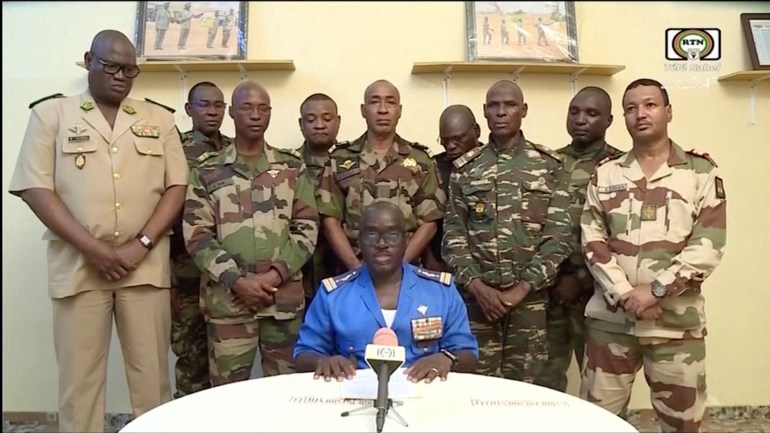
Thursday, July 27
In his first communication since the coup, Bazoum said on X that “hard-won gains will be safeguarded”.
“All Nigeriens who love democracy and freedom would want this,” he said.
Bazoum’s Foreign Minister Hassoumi Massoudou also posted on X, calling on “all democrats and patriots” to make this “perilous adventure” fail.
Meanwhile, more foreign leaders condemned the coup. The German foreign ministry said it was following the continuing events with “very great concern”.
Niger’s army declared allegiance to the defence and security forces that overthrew Bazoum. Army Chief of Staff Abdou Sidikou Issa said the decision was necessary to “avoid a deadly confrontation between the various forces”.
France landed a military aircraft in Niger despite an airspace closure imposed after the announcement of the coup, army Colonel Amadou Abdramane said on state television.
In Niamey, supporters of the coup gathered in front of the National Assembly and some moved on to the headquarters of the governing party, which was ransacked and set on fire, sending plumes of black smoke billowing into the sky.
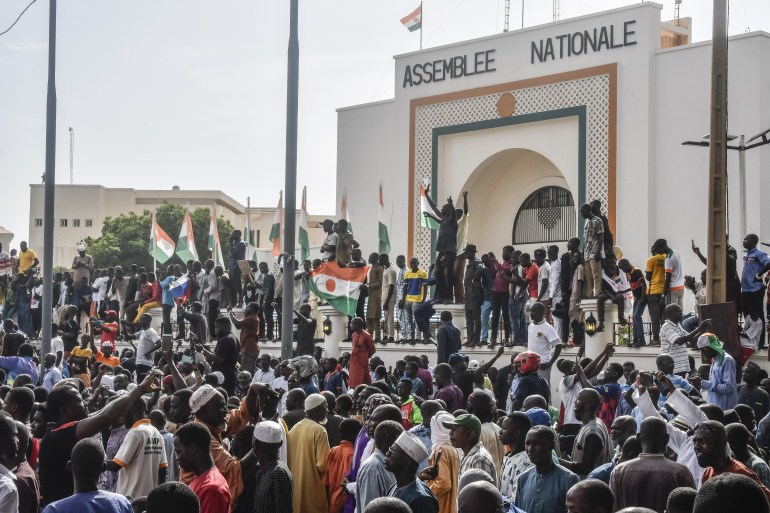
Friday, July 28
Abdourahmane Tchiani, head of Niger’s presidential guard, named himself head of a transitional government. He made the announcement on state-run television, saying he was the “president of the National Council for the Safeguard of the Homeland”.
The 62-year-old general also said the intervention had been necessary to avoid “the gradual and inevitable demise” of the country.
Colonel Abdramane said on state TV that the constitution had been suspended.
ECOWAS announced it would hold an emergency meeting on Sunday in Abuja, Nigeria’s capital.
French Foreign Minister Catherine Colonna told French media that President Emmanuel Macron had spoken to Bazoum several times.
The French diplomat said France believed there were still possible exits from the crisis, and that the coup did not have any legitimacy.
Wagner mercenary boss Yevgeny Prigozhin, who remains active despite leading a failed mutiny against the Russian army’s top brass last month, hailed the coup and offered his fighters’ services to bring order.
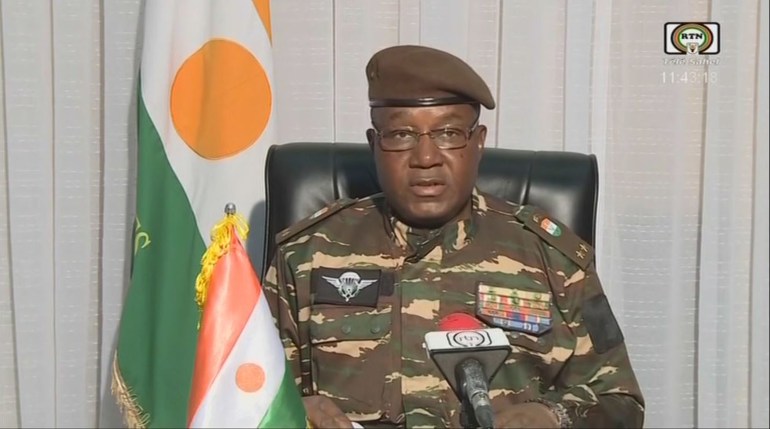
Saturday, July 29
The EU and France cut off financial support to Niger and the United States threatened to do the same.
“In addition to the immediate cessation of budget support, all cooperation actions in the domain of security are suspended indefinitely with immediate effect,” EU foreign policy chief Josep Borrell said in a statement.
According to its website, the EU has allocated 503 million euros ($554m) from its budget to improve governance, education and sustainable growth in Niger over the 2021-2024 period.
The French foreign ministry said France had suspended all development aid and budget support with immediate effect, demanding a prompt return to constitutional order with Bazoum back in charge. French development aid for Niger was at approximately 120 million euros ($130m) in 2022, and was expected to be slightly higher this year.
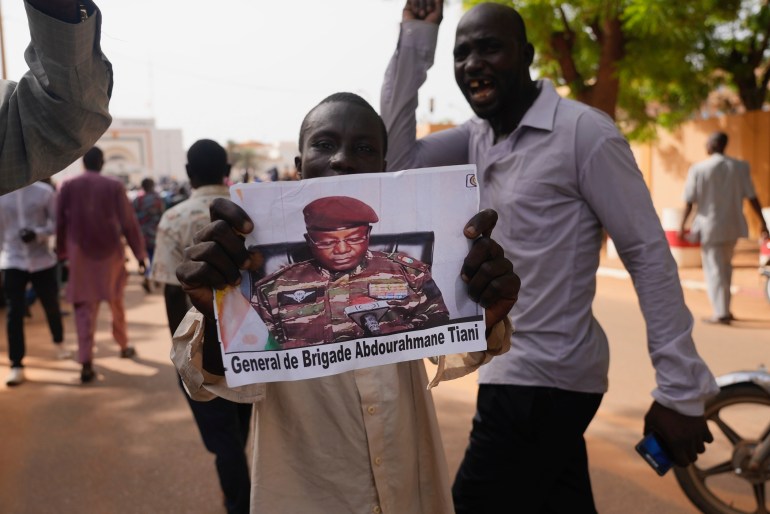
Sunday, July 30
As ECOWAS leaders gathered in the Nigerian capital for an emergency summit on what actions to take to restore constitutional order in Niger, military leaders warned against any armed intervention.
“We want to once more remind ECOWAS or any other adventurer of our firm determination to defend our homeland,” military spokesperson Colonel Amadou Abdramane said.
Meanwhile, the 15-nation regional bloc demanded that Bazoum be reinstated within a week. Otherwise, it would take “all measures” to restore constitutional order.
“Such measures may include the use of force for this effect,” ECOWAS said in a statement, adding that its defence chiefs were to meet later on Sunday.
It was not clear how ECOWAS could use force. The West African bloc also slapped financial sanctions on the coup leaders and the country, freezing “all commercial and financial transactions” between member states and Niger.
After attending the meeting, Chad’s President Mahamat Idriss Deby travelled to Niger to meet with military leaders involved in coup, and to present initiatives to solve the crisis. He also met Bazoum and later posted an image of his meeting with the deposed leader.
The AU issued a 15-day ultimatum to the military government in Niger to reinstall the democratically elected government.
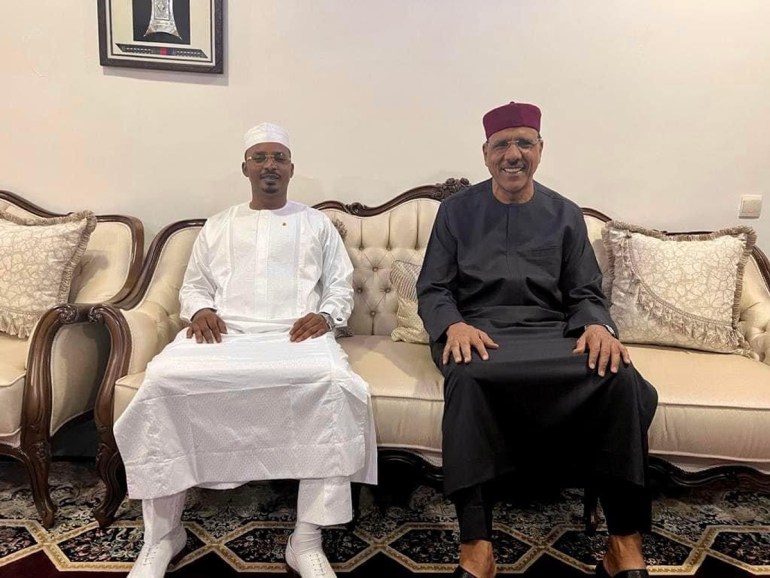
Monday, July 31
The coup leaders alleged that the toppled government had authorised France to carry out an attack on the presidential palace to try to free Bazoum. Abdramane said the authorisation was signed by Foreign Minister Hassoumi Massoudou, acting as prime minister.
Germany said it would halt cooperation with the West African nation with its foreign ministry spokesperson saying that all direct support payments to the central government of Niger would be suspended until further notice.
A planned 30 billion CFA franc ($51m) bond issuance by Niger scheduled in the West African regional debt market was cancelled by the Central Bank of West African States (BCEAO).
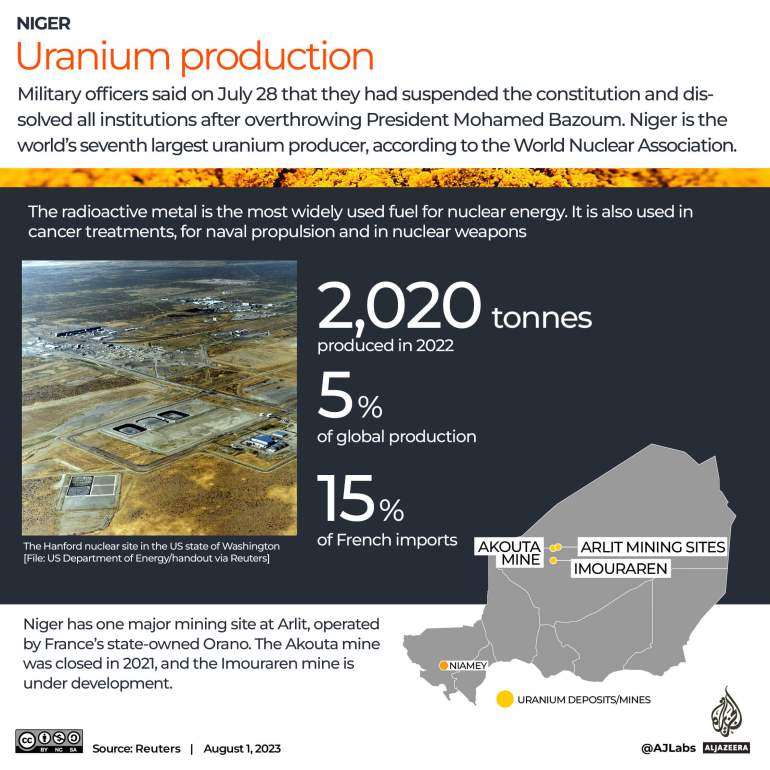
Tuesday, August 1
The price of uranium rose slightly as mining operations continued in the world’s seventh-largest producer of the radioactive metal, but a consultancy warned that prices could rise in the coming weeks.
The spot price of uranium, widely used for nuclear energy and treating cancer, crept up to $56.25 a pound from $56.15 a week earlier, market research firm and consultancy UxC said.
The EU’s nuclear agency, Euratom, said it saw no immediate risks to the EU’s nuclear power production should Niger cut its deliveries of uranium due to the military coup.
Eurotom told the Reuters news agency that the bloc had enough uranium inventories to fuel its nuclear power reactors for three years.
Wednesday, August 2
An Italian military plane carrying 87 evacuees from Niger arrived in Rome early on Wednesday.
Some 36 Italians, as well as four Bulgarians, two Austrians, and one citizen each from the United Kingdom, Niger, Nigeria, Hungary and Senegal were on the plane, as well as military personnel. There were also 21 United States citizens, a number of whom were part of an evangelical Christian group from Texas, according to the Italian Foreign Ministry.
Niger also announced the reopening of its borders with Algeria, Burkina Faso, Chad, Libya and Mali. The borders that have reopened are mainly in remote desert areas. Niger’s key entryways for trade and commerce remain closed due to restrictions imposed by ECOWAS.